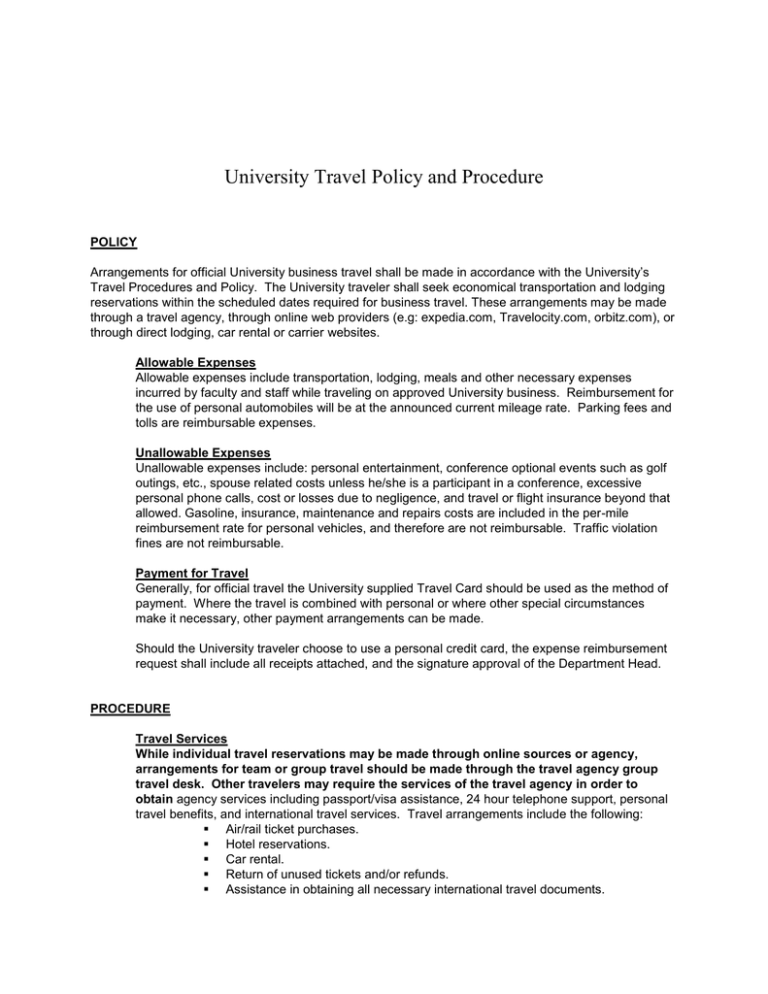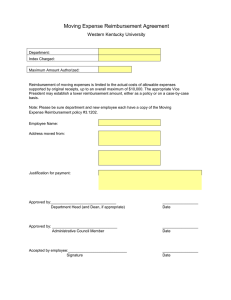University Travel Policy and Procedure
advertisement

University Travel Policy and Procedure POLICY Arrangements for official University business travel shall be made in accordance with the University’s Travel Procedures and Policy. The University traveler shall seek economical transportation and lodging reservations within the scheduled dates required for business travel. These arrangements may be made through a travel agency, through online web providers (e.g: expedia.com, Travelocity.com, orbitz.com), or through direct lodging, car rental or carrier websites. Allowable Expenses Allowable expenses include transportation, lodging, meals and other necessary expenses incurred by faculty and staff while traveling on approved University business. Reimbursement for the use of personal automobiles will be at the announced current mileage rate. Parking fees and tolls are reimbursable expenses. Unallowable Expenses Unallowable expenses include: personal entertainment, conference optional events such as golf outings, etc., spouse related costs unless he/she is a participant in a conference, excessive personal phone calls, cost or losses due to negligence, and travel or flight insurance beyond that allowed. Gasoline, insurance, maintenance and repairs costs are included in the per-mile reimbursement rate for personal vehicles, and therefore are not reimbursable. Traffic violation fines are not reimbursable. Payment for Travel Generally, for official travel the University supplied Travel Card should be used as the method of payment. Where the travel is combined with personal or where other special circumstances make it necessary, other payment arrangements can be made. Should the University traveler choose to use a personal credit card, the expense reimbursement request shall include all receipts attached, and the signature approval of the Department Head. PROCEDURE Travel Services While individual travel reservations may be made through online sources or agency, arrangements for team or group travel should be made through the travel agency group travel desk. Other travelers may require the services of the travel agency in order to obtain agency services including passport/visa assistance, 24 hour telephone support, personal travel benefits, and international travel services. Travel arrangements include the following: Air/rail ticket purchases. Hotel reservations. Car rental. Return of unused tickets and/or refunds. Assistance in obtaining all necessary international travel documents. Agency websites currently provide a complete search of all internet online providers in ascending order beginning with least cost in a four hour window for departure and arrival. Reservations may be made with the travel agency resources listed below: World Travel Inc. 1724 W. Schuylkill Road Douglassville, PA 19518 Phone: (610) 327-9000 (800) 341-2014 x1058 www.worldtravelinc.com GTI Corporate Travel 111 Township Line Road Jenkintown PA 19046 Phone: (215)379-6800 (800)223-3863 www.gtitravel.com/lasalle Air Travel Whenever possible, air travel on University business should be on regularly scheduled commercial airlines. Economy class should be used when traveling on domestic and international commercial airlines except where special circumstances suggest otherwise, such as: Economy class or alternate flights are unavailable. The traveler's personal physical requirements dictate the use of another class. Rail Travel Regular coach class should be used whenever possible. Metroliner service in the Washington Philadelphia - New York corridor is authorized. Car Rental Online auto rental websites or a travel agency may be used to determine the most economical car rental facility at the location where a car is needed. A car should be rented only when it is either the most economical means of travel or it is necessary due to the nature of the trip. Generally, a compact, intermediate or mid-size car should be rented unless particular circumstances suggest the need for a larger vehicle. Travel Insurance Individuals who charge air travel costs to the University Travel Card are provided business travel accidental death insurance of $1,000,000. In those cases where this is not provided, up to $8 per trip may be charged as a cost of travel for the purchase of travel life insurance. Lost luggage Locator Service is provided when the trip is charged to the University Travel Card. Call1-800VISA-911 to contact the service. Personal Vehicles Personal vehicles may be used for university business when the cost to the University is not excessive in relation to purchased transportation. Occasionally, faculty/staff members may desire to take their personal vehicle on long distance university business trips in lieu of purchased transportation. In these instances, reimbursement will be limited to the lesser of the personal vehicle mileage reimbursement or least costly purchased air or rail transportation, whichever is appropriate to the travel. Mileage reimbursement will be made at the rate currently allowed by the federal government. (Gasoline, insurance, maintenance and repairs costs are included in the per-mile reimbursement rate, and are therefore not reimbursable.) Hotel Accommodations Faculty/staff should book their hotel accommodations through a travel agent, through a web provider or hotel-direct website to arrange for preferred rates whenever possible. When attending a Conference, Convention or Seminar and it is necessary to stay at a particular hotel, it is suggested that the travel agent be consulted. Often there may be a corporate rate available that could be below the convention rate. However, if this is not the case, then the hotel arrangements should be made with the convention hotel in accordance with the instructions for the particular convention or meeting. Receipt Requirements Internal Revenue Service regulations require that supporting documentation be provided for expenses associated with payment or reimbursement for travel related expenses, otherwise these regulations require the University to report such payments as taxable income to the traveler. Therefore, wherever possible, all expenditures should be supported by original receipts. These would include the “cardholder’s copy” of credit card transactions and the “passenger’s copy” of airline tickets. A written explanation should be provided for individual expenditures exceeding $25 not supported by a receipt. Travel Advances Since most travel related expenses can be charged to the University Travel card, this is the preferred method of handling them. However, when out-of-pocket charges are expected to be significant (usually in excess of $50) and when approved by the traveler’s department head, travel advances can be arranged through the Bursar’s Office. Advances in excess of $250.00 require the approval of the Dean, Provost or Vice President. Travel advances should be reconciled and excess funds, if any, returned within 30 days of completion of the trip. Important Note: In all cases, even where there are no funds due to the traveler or the University, the Travel Expense Report must be presented to the Bursar’s Office in order to clear the advance from the traveler’s accountability. Advances can be picked up by presenting a completed Petty Cash Voucher form to the Bursar’s Office. Generally, travel advances should not be picked up more than 5 days before the scheduled travel. Important Note: IRS regulations require that advances which have not been reconciled upon completion of the travel must be reported as taxable the W-2 statement. Travel expense reconciliations are accomplished by the presentation of this form to the Bursar’s Office upon the completion of travel. TRAVEL EXPENSE FORM INSTRUCTIONS 1. Please print or type all information 2. Reports should be filed within 30 days of trip completion 3. Where practical, all expenditures should be supported by original receipts. Please organize and secure receipts with tape to an 8 ½ x 11 attachment page. Please provide explanations for expenditures in excess of $25 not supported by a receipt. 4. This is intended to be a composite report. Please report all expenses associated with a trip on one report form. Please deduct in the appropriate section of the form any advances received and any amounts that were either paid directly by the University, such as a conference registration fee, or amounts that have been charged and will be paid separately. In the case of reimbursement for local travel by auto, mileage may be accumulated and reported on one form for multiple trips. 5. If a cash advance was received, take the completed report to the Bursar’s Office. Payment should be made for any amount due to the University. Any balance due to the traveler will be distributed by the cashier upon receipt of the completed Travel Expense Report in the Bursar’s Office. If a cash advance was not requested, and there is an amount due to the traveler, the completed Travel Expense Report should be sent to the Accounts Payable and Purchasing Department. 6. Expense reports should be signed by the traveler and approved by the Department Chair or Department Head responsible for the budget to which the expense is being charged.
